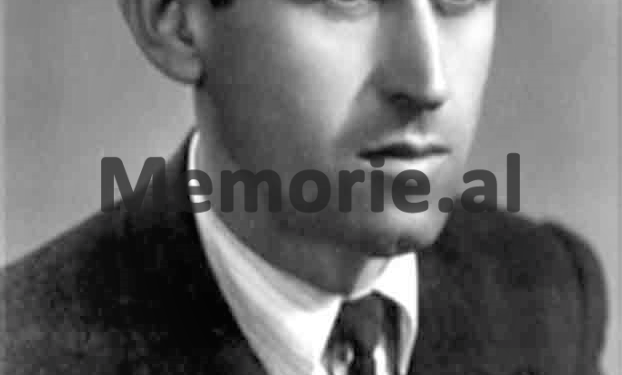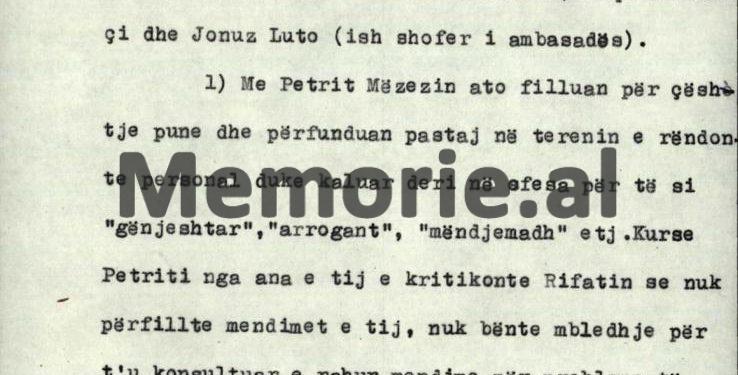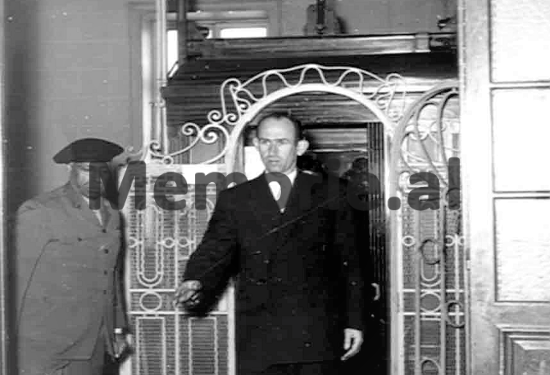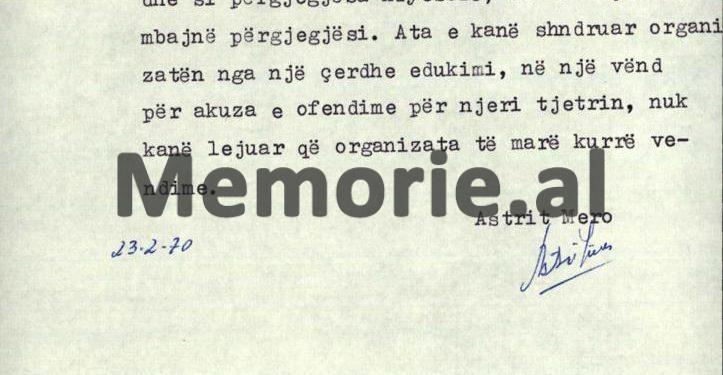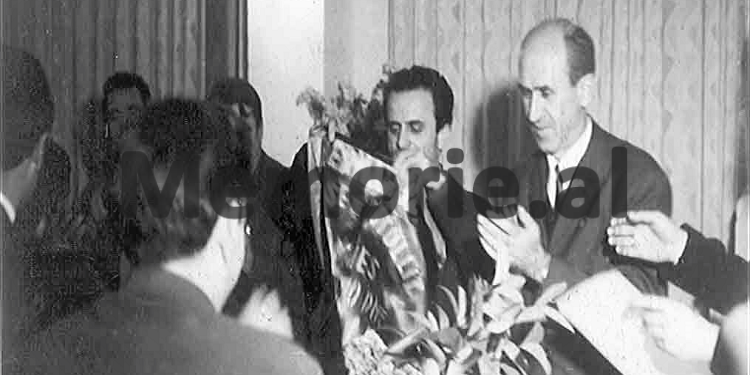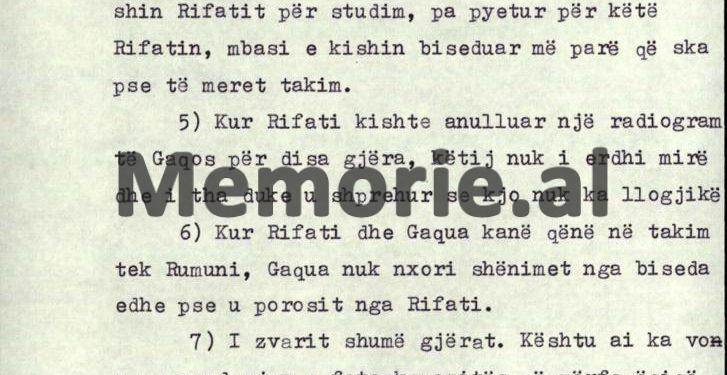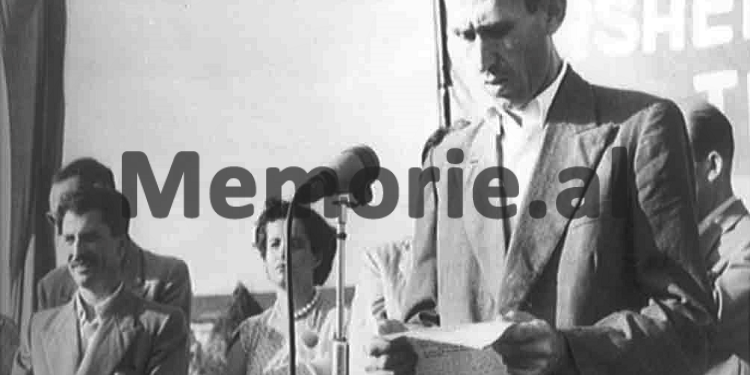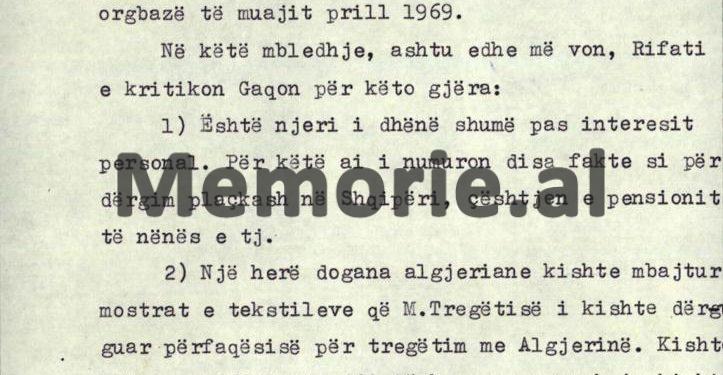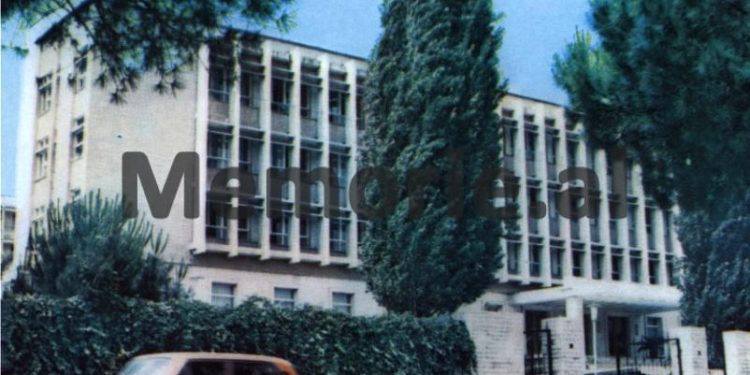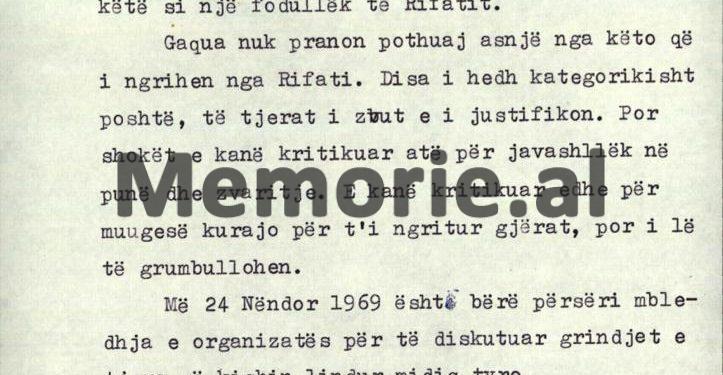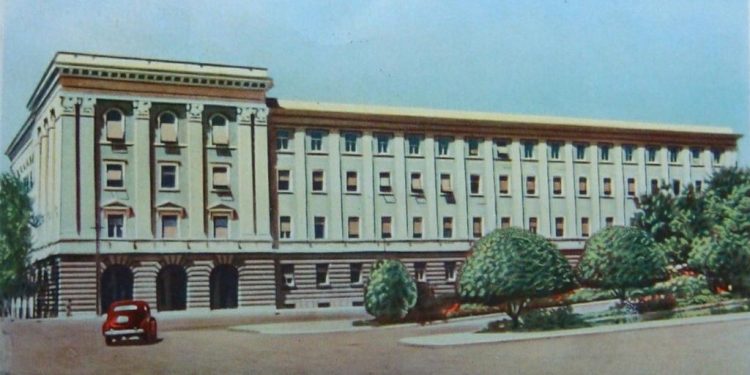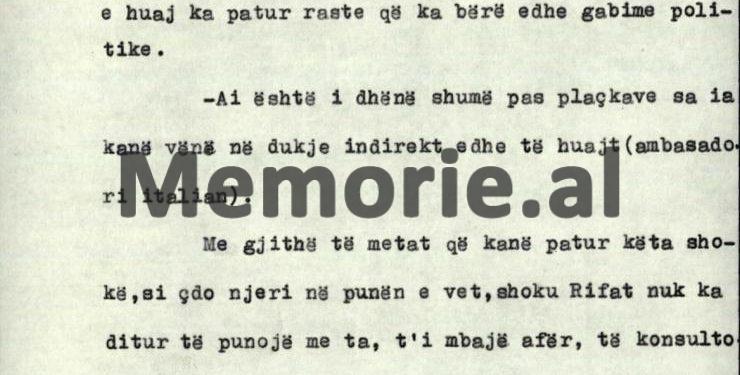Dashnor Kaloçi
Memorie.al publishes some archival documents labeled “Sekret” taken from the Central State Archive in Tirana (the fund of the former Central Committee of the ALP), which belong to the year 1970 and are part of a file containing a correspondence between the Ministry of Foreign Affairs and the Department of Foreign Relations, near the apparatus of the Central Committee of the PPSh, with relations, reports, letters, instructions, information, etc., which are about the problems that had arisen, in some of the accredited Albanian diplomatic missions in different countries of the world. In the said file, there is also an information report drawn up by the diplomat Astrit Mero, who informs his superiors in the Ministry of Foreign Affairs and the Foreign Relations Sector at the Central Committee of the PPSh, regarding the contradictions and the fierce conflicts that took place in the Albanian embassy in Algiers, between diplomats Rifat Dedja, Gaqo Totokoçi, Petrit Mezezi, Jonuz Luto, etc.,
The document drawn up by the diplomat Astrit Mero, sent to the Ministry of Foreign Affairs in Tirana, regarding the contradictions and ongoing conflicts between some diplomats in the Albanian embassy in Algiers
ABOUT THE DISAGREEMENTS AND FIGHTS BETWEEN FRIENDS RIFAT DEDJA AND GAQO TOTOKOÇI
Disagreements and quarrels between friends Rifat Dedja and Gaqo Totokoçi came to the fore in the months of February-March of 1969, during the analysis of the work at the representative office. Then these were presented at the meeting of the basic organization in April 1969. In this meeting, as well as later, Rifati criticized Gaqo for the following reasons:
- He is very devoted to personal interest. For this, he mentions some facts, among others; he mentions the sending of clothes to Albania, the issue of his mother’s pension, etc.
- Once, the Algerian customs had kept the textile samples that the Ministry of Trade had sent to the representation for trading in Algeria. The driver went to pick them up, but they didn’t let him. Then, Rifat tells Gaqo to go and get them himself. He refused at first, saying that it was not his duty to pick them up, but the driver’s. But in the end, he obeyed and went.
- Another time, Rifati wanted to talk to Gaqo about the issue of a radiogram on Podgorn’s visit to Morocco. He called him with the code, but after waiting for over a quarter of an hour, he did not go, he went down to Gaqo’s office by himself, without saying anything. He apologized for not going, as he had some things in his hands.
- Gaqo had requested a meeting with the Director of the Library to get some books that Rifat needed for study, but without asking Rifat about this first.
- When Rifati had canceled a radiogram of Gaqo for some issues, the latter did not like it, and I tell you that: this thing has no logic.
- When Rifati and Gaqo went to Romania for a meeting, Gaqo did not take notes from the conversation, even though he was instructed by Rifati.
- He procrastinates a lot, and in this case, he was late in setting up the representation’s photo exhibition.
- He shows no interest in reading and listening to the radio.
- As Deputy Secretary of the Party’s Basic Organization, he did not contribute to the smooth running of the work.
- When Gaqo returns from meetings, he does not always inform Rifat.
- When they were both in different receptions, several times Gaqo left Rifat alone. While during a conversation with a foreign diplomat, Gaqo posted the conversation on another topic.
- When they once went to the Ministry of Foreign Affairs for a document, Gaqo did not want to keep the bag with documents, considering this as Rifat’s arrogance.
Gaqo does not accept almost anything from these problems that Rifati has raised. Some he rejects categorically, while others he softens and justifies. But even his friends have criticized him for being slow at work and procrastinating. They have also criticized him for a lack of courage.
On November 24, 1969, the meeting of the Basic Organization of the Party was held again, because of the quarrels that had erupted between them. The issue was that Rifati would go to talk with the Bulgarian counterpart.
As always, Gaqo went to the car, but Rifati tells him that there is no need for you to come. Then Gaqo ran away. The next day he went to discuss the matter with Rifat, to decide how to act (I think he is right about this). But, as Rifati explains, Gaqo went to his office without saying good morning, since I don’t say it either.
After they discussed some work issues, he raised the issue of accompanying him to meetings, so that this could be resolved. When Rifati told him that: you have sometimes left me alone in work meetings, Gaqo replied that these were slanders and things got so bad that Rifati kicked Gaqo out of the office.
In this meeting, no decision was taken because there was no one to take it for the conditions of that organization. The Central Committee and the Ministry of Foreign Affairs were informed about the situation. On the other hand, Gaqo had asked the Ministry of Foreign Affairs to return to Albania, as his stay there had become unbearable.
It is difficult to prove all the criticisms addressed to Gaqo. They may not all be true, but some of the reality is within them.
1 – Even in the meeting we were in, it turned out that Gaqo had collected things for Rifat, in a closed form, as criticized by other friends.
2 – In the affairs of the Basic Organization of the Party, he did not provide the necessary assistance as Deputy Secretary. Perhaps because he was unhappy that he was not elected Secretary in 1968.
3 – Both Gaqo and Rifati have used the meetings of the Basic Organization for their own interests and for this they bear a heavy responsibility. They transformed the organization from an educational institution into a place where mutual accusations were made. In this organization, decisions were never made.
Astrit Mero
13.2.1970
On some issues arising from the meeting of the Basic Organization of the Party, for Comrade Rifat Dedja
Comrade Rifat did not have good social relations with comrades Petrit Mzezezi, Gaqo Totokoçi, and Jonuz Luto (former embassy driver).
1 – With Petrit Mzezi, the disagreements started on work issues and then ended on a personal level, moving to offenses such as: liar, arrogant, conceited, etc.
Petriti, on the other hand, criticized Refati for not taking into account his opinions and not holding meetings to consult on the solution of various problems.
2 – With Jonuz Luton, Rifati did not speak as he had spoken to his wife. I, Rifati had stated at the meeting, did not say good morning or good evening to him. And I don’t even have to say these things, since this guy has the behavior of a thug.
3 – Even with Gaqo Totokoçi, quarrels and disagreements started on the same ground. Creating the opinion that Gaqo had no respect for Rifati, he once took him out of the office, after he had previously had a fierce argument with each other.
Even in the Basic Organization of the Party, an honorable situation had been created due to the disagreements between Rifat and Gaqo. The organization had become largely a place that dealt with the quarrels between these two.
Gaqo has criticized Rifat, because he starts with the intention of discretizing him. He, in his relations with his friends, lacks tact, and makes distinctions between them, behaving arrogantly.
He keeps the people who no longer work there in his mouth, and declares that if I got angry with you, I will never see you again. In conversations with foreign diplomats, there were times when he made political mistakes. He is fond of clothes and this has been pointed out by foreign diplomats (specifically the Italian ambassador).
With all the flaws that these friends had, like any man in his work, Rifati did not know how to work with them, keep them close, consult with them, etc. In some cases, his attitudes towards friend Gaqo were not socially correct.
When friend Gaqo was getting ready to go with him to a reception, after getting into the car, he told him that you don’t need to come with me there, or the occasion, when he took him out of the office, etc. Memorie.al
8.6.1970




